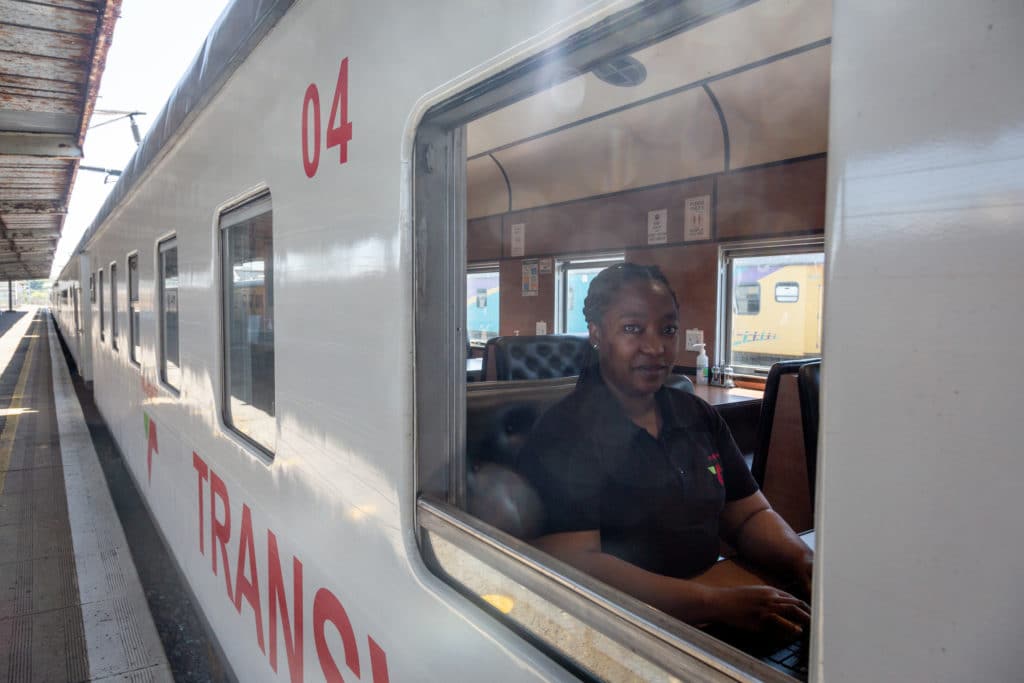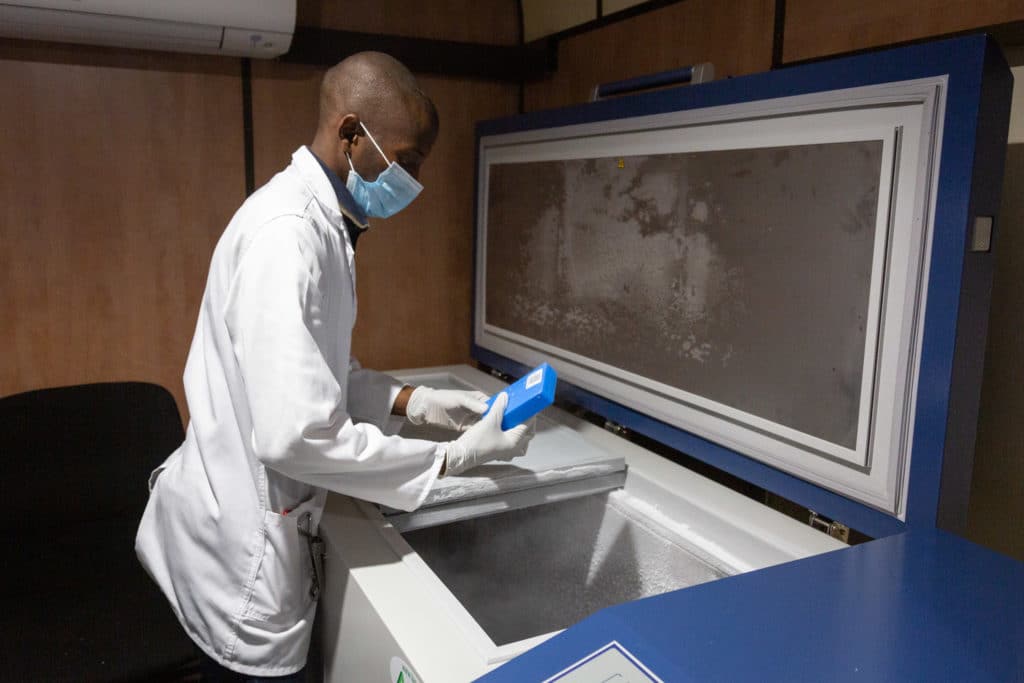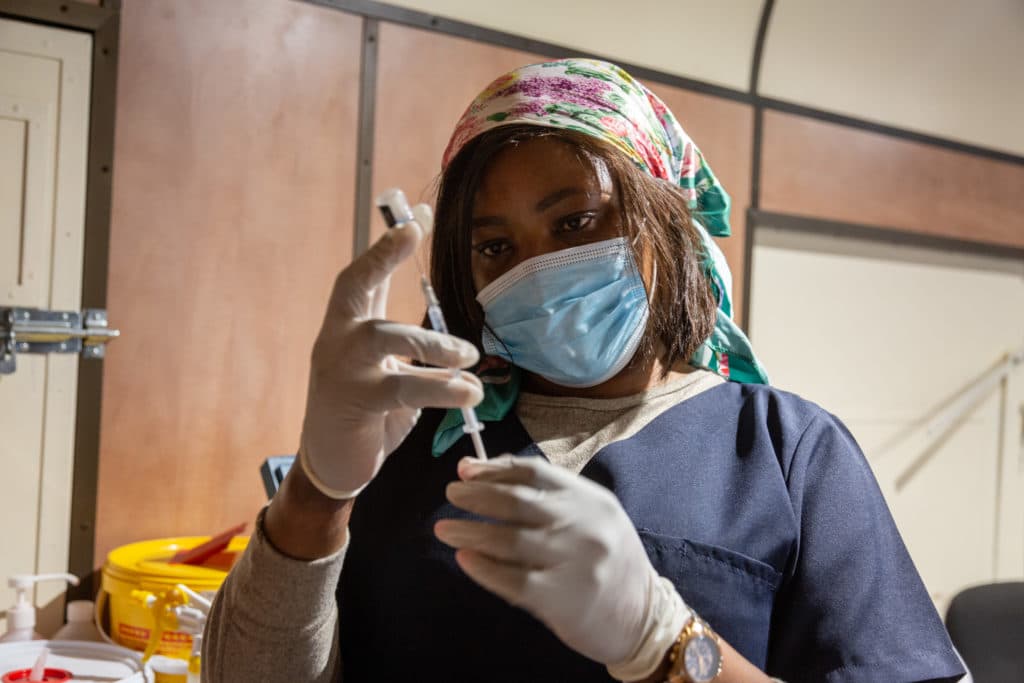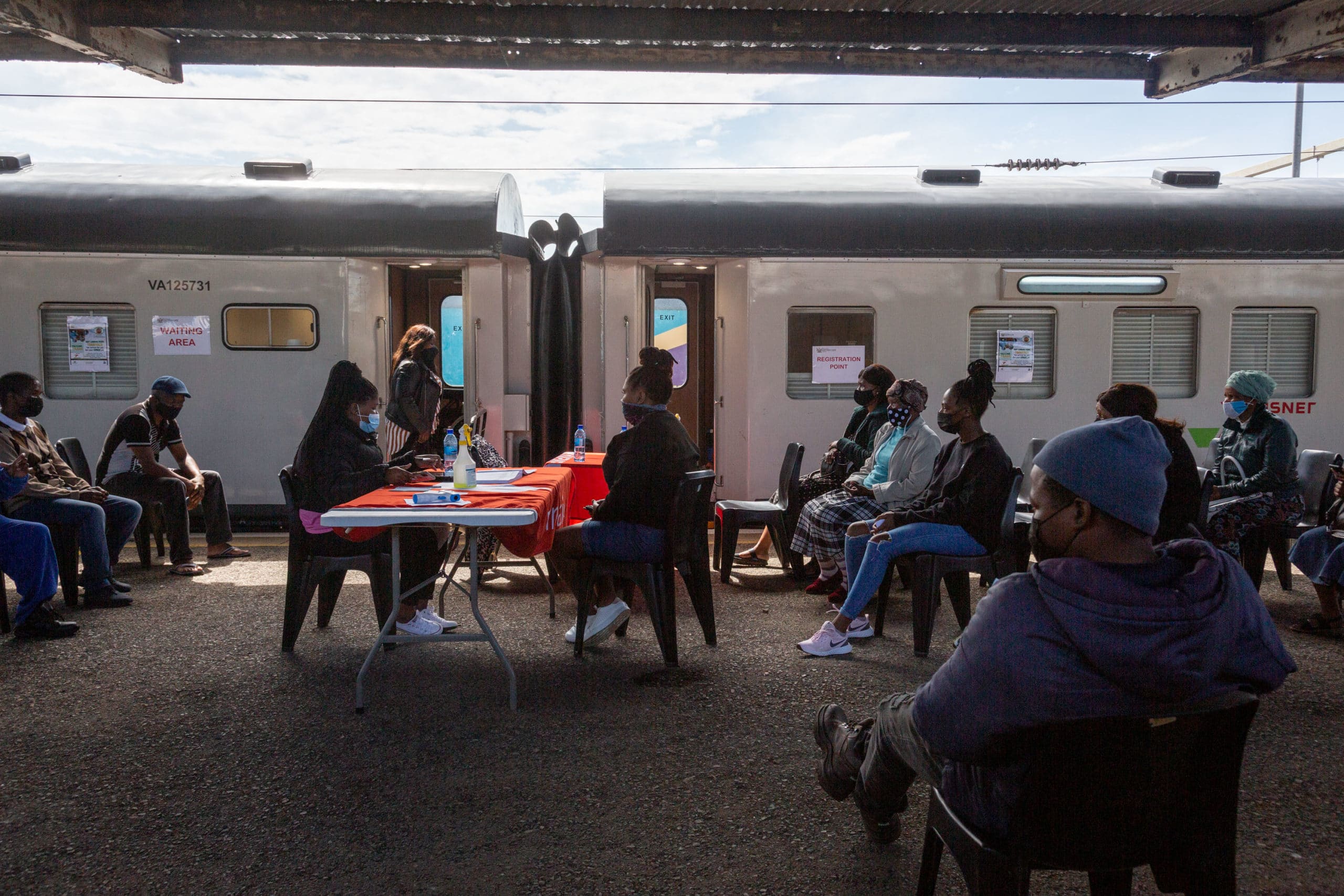In vast and varied rural South Africa, Covid-19 vaccines are making their way to the people by rail. The Transvaco train is a moving vaccine station delivering virus protection to communities beyond.
ON THE N6 highway in the Eastern Cape province of South Africa, towards the coastal city of East London, the flat dry expanse of the highveld begins to give way to rolling hills along the shoreline.
The second-largest province in the country at over 65,000 square miles, it’s of a size that you can’t easily cover on four wheels.
Across an occasional bridge, far on the horizon, locomotives shimmer, chugging along into the rural landscapes, carrying goods and logistical services into some of South Africa’s remotest parts.
One such trainset, christened Transvaco, is a health innovation on rails.
Loading...
At the time that FORBES AFRICA visited in October, it was parked in the East London central train station and provided a unique service – vaccination against Covid-19 to people who can’t otherwise access them.
“The Transvaco initiative allows us to offer vaccines to patients in rural areas who do not have easy access to
healthcare facilities, like the hospitals or clinics,” says Dr Paballo Mokwana, Transvaco’s manager, to FORBES AFRICA. “We run on the railway lines, which makes it easier for patients to come through to us as opposed to going to a normal hospital.”
Mokwana, a physician who originally specialized in dentistry, has a passion for public health and has worked in the space for over a decade. Small in stature, but with
a commanding presence, her friendly demeanor and professionalism can be seen reflected in her interactions with staff and patients.
Privatized healthcare in South Africa is of a high standard but inaccessible to most residents, and doctors like Mokwana strongly believe in making the widest impact they can – this is particularly the case when it comes to access to rural healthcare.
Access to healthcare in South Africa is reportedly challenging in general, but particular obstacles in both infrastructure and distance make this worse for rural citizens, reported to be around 47% of the population (as per Stats SA, 2013). Income inequality has a clear correlation between distance to healthcare facilities, with the country’s poorest living farthest from public health infrastructure. Any historian will tell you that much of this geographical policy is a legacy of apartheid and the homeland system, which left many communities across the country segregated along racial lines in far-flung parts of the country.
This has clear medical consequences according to reports – provinces with high rural populations such as the Eastern Cape
tend to have higher levels of infant mortality and lower levels of immunization in particular.
However, while healthcare infrastructure in rural areas is clearly a challenge both in terms of development and access, South Africa’s railway infrastructure is the most- developed on the continent.
Historically driven by an urge to foster easier trade with South Africa’s neighbors, and then to link all of the British territories in Africa, much of the existing railway infrastructure is managed by Transnet, a publicly-owned company responsible for the management of rail, port and pipelines in the country.
Despite extensive cable theft in recent years which has damaged some of the country’s railways, rail remains a fundamental means of accessing rural South Africa, with thousands of citizens – some 10% of the population – making use of the public railway infrastructure every day.
“One must obviously take into consideration the existing problems faced by the Passenger Rail Agency of South Africa (PRASA), but the Transvaco initiative is a great initiative – the idea of using it to vaccinate and encourage commuters to take the jab is a great one,” says Zukiswa Vuka of #UniteBehind, a civil society coalition that mobilizes around many issues including public transport.
Railway-based healthcare is a novel idea, but not for South Africa, which has run a similar initiative from Transnet previously with two other trains, christened Phelophepa I and Phelophepa II. Commissioned in 1994 and still operating to this day, the Phelophepa trains render primary healthcare initiatives which include general medical consultations, dental, optical, mental health and pharmacy services to rural South Africans by rail.
Transvaco was born with this awareness in mind. Transnet Engineering CEO Ralph Mills and Transnet CEO Portia Derby were visiting the Phelophepa trains late last year, discussing the practicalities of vaccine distribution in a country as vast and varied as South Africa, and the question of the rural distribution of vaccines came up. Derby was immediately supportive of the suggestion – tasking Mills with the practicalities of the development of a vaccine-focused trainset.
“Portia [Derby] asked me if we could build a vaccination trainset – I said ‘yes we could’ immediately…,” says Mills.
As it turns out, it wasn’t that difficult.
“Transnet has done a project like this before,” says Mokwana. “We have what we call the Phelophepa healthcare trains, which offer healthcare services also on the railway lines, traveling to rural areas that do not have access to healthcare facilities, they offer dental services and normal healthcare services and eye care. So when Transvaco came about, it built and designed off a pre-existing model that has been tried and tested for over 27 years. And hence when the need came to assist the government in vaccinating people, this model was used.”
Breaking Stereotypes On The Move

Dr Paballo Mokwana is currently Transvaco’s train manager. Mokwana studied medicine at the University of Pretoria, and completed her community service in 2013. After performing locum work for a year and a half, she joined the Phelophepa family and has not left since. “It’s the first real job I had, and it’s all I’ve done,” she says.
Two out of the three Transnet health trainsets are female-run, which is not unusual according to Mokwana. “We’ve broken all of the norms when it comes to that. In the medical sector, it was for a very long time male-dominated, on the trains, it’s a 50/50 split… nursing has been typically female, we’re seeing those barriers being broken [on the health trains].”
Committed to public health, Mokwana speaks on the impact of working on the Phelophepa and Transvaco trains on both herself and the patients they serve. “For me, it’s joy and fulfilment in helping someone who can’t afford or access high-end medical attention, seeing somebody deserving of something access it… we know we’ve really made a difference and impacted someone’s life, and for me, that’s fulfilling!”
These two trains serve around 360,000 persons annually, and when the Covid-19 pandemic hit, it was a natural progression to consider a similar initiative once the vaccines became available. It was from this that Transvaco was born.
“The Transnet train, Transvaco, is an innovation to take the vaccination to people in transport nodes and it will encourage a lot of people to vaccinate,” Gauteng Premier David Makhura said during the launch of the train earlier this year.
The trainset was manufactured over less than nine months, after a trial period of vaccinations through the Phelophepa trains was a success. At a cost of $1.5 million, the Transvaco trainset makes use of some existing carriage systems which helped to reduce costs and keep construction time to a minimum.
However, vaccine administration required some specialized differences – specifically with regard to the storage of the vaccines, which includes two ultra-low temperature refrigeration systems that allow for the holding of both the single dose Johnson & Johnson vaccine and the two-shot Pfizer vaccine.
Transvaco offers all patients the choice as to which vaccine they receive, something not common at other public health vaccination sites in the country, with the reasoning that since the train is only in each location for two weeks at a time, patients may not be able to easily get their second vaccination shot easily elsewhere.
“It’s not unique in terms of equipment,” says Mills. “We took the concept of a health train and made it smaller, with 10 coaches, a light train that could be hauled by 18-tonne locomotives anywhere in the country. The primary difference were the two ultra-low vaccine freezers which had to be imported.”
Working on the Transvaco train offers a different experience of vaccination to both patients and staff in comparison to standard public healthcare.
Veteran nurse Bongani Nxumalo, who has worked in state healthcare in pediatrics and labor wards as well as NGOs across the country, has found it to be a personally rewarding experience working on a platform that makes contact with South Africans across the country. “It’s quite different [from state healthcare] because we’re moving from station to station, province to province – we are experiencing people with different visions of life… with their own perspectives. It’s made us grow as medical staff learning how to manage and deal with patients, especially when it comes to vaccinations,” says Nxumalo to FORBES AFRICA.

Rendzo Marima, chief pharmacist of the Transvaco train, retrieves vaccines from the specialized freezer on the train.
Mokwana holds similar sentiments; appreciating the diversity of patients that the Transvaco train services and the importance
of managing this when it comes to vaccine administration; “Interacting with so many different people you get to appreciate and understand how important healthcare services are, especially when people do not have easy access to it. We are able to reach a large number of people who wouldn’t ordinarily be able to access the vaccination drive.”
“At Rovos Rail, we are pro-vaccination,” says Brenda Vos, Communications Manager at Rovos Rail, a bespoke rail-tour operator which provides luxury excursions in Africa. “The more people in rural areas want to be vaccinated and have access, it’s a good thing, because otherwise you might have to travel for a long time to get access to vaccination in a city clinic.”
Even Mills was surprised. As part of an internal marketing initiative to promote vaccination within Transnet, Mills received his first dose of the vaccine on Transvaco – and due to the experience, so did his entire family. “It’s really the best risk-reduction element we have,” he says. “Vaccination is the only thing that will really make a difference, otherwise we’ll always be swinging between these waves.”
This plays a particularly important role when it comes to vaccine hesitancy, which is something the staff of Transvaco have had experience managing. Meta analyses of Covid-19 vaccine hesitancy in South Africa indicate that by and large, South Africans understand the value and need to become vaccinated against Covid-19; however, also emergent in these results is that urbanicity – that is, the degree to which an area is urbanized – is an influencing factor in vaccine acceptance (Cooper et al, 2021).
Hand in hand with the rise of Covid-19 vaccine hesitancy is of course the massive rise of vaccine misinformation, which is something many of the Transvaco visitors have been exposed to.
“Some people have said that maybe we are being sent by the government to kill them [with the vaccine]. There are those who will just tell you, ‘I don’t trust the vaccine’,” says Nxumalo, clearly frustrated. “We are a people who love to go off on social media, and people create their own stories. I tell them, ‘do your research, you can’t rely on something that you’ve just been told by someone on social media’.”

A nurse prepares to administer a Covid-19 vaccine on the train
Though the train’s unique access to rural areas by means of railway infrastructure is certainly one of its advantages, the one aspect that seems to draw people in to visit Transvaco for their vaccinations, besides sheer curiosity, is the welcoming nature of the staff. “I only came here because I know the people are friendly, and it would be empty compared to the clinics,” says Lena, who hopped on to the train to receive the Johnson & Johnson vaccine.
From East London and having easy access to vaccination at local clinics, Lena decided on Transvaco because of the staff ’s reputation for both friendliness and efficiency, something not always associated with public healthcare in South Africa – this despite her own fear and hesitation at getting her first shot. “I’m a bit nervous – but it’s mainly because I’m scared of needles.”
This reputation for friendliness has also seen a disproportionate number of foreign nationals making use of the Transvaco sites.
“One of the experiences that stands out for me is with foreign nationals. They are more receptive to the train,” attests Mokwana. As the numbers of people coming in and out of the station due to Transvaco increases, ancillary benefits can be seen the traders and vendors crowding around the outside of the station, with their wares on small tables under umbrellas – snacks, cold drinks and cigarettes are on offer.
These informal traders, battered by Covid-19 and the ensuing lockdowns, have taken advantage of the increased traffic around the station.
“They tell them after the shot you must have something to drink and rest,” one trader says. “They are buying cold drinks from me every day, but today the train is going.” As FORBES AFRICA prepared to depart from the site on a Friday afternoon after spending two days with the staff and documenting their operations, it is clear that the Transvaco initiative does still confront the normative challenges facing public health and vaccination in South Africa.
The hum of the trainset’s diesel generator reverberates in the background, a constant reminder of the electricity crisis still gripping the country that Transvaco must guard against, particularly to protect its precious vaccine stock – this as Mokwana speaks candidly of the occasional delays transiting between sites as the train is held up due to cable theft.
Despite this, as the sun begins to set on the Eastern Cape, new arrivals still trickle in to get their vaccination shots on the eve of the weekend when traditionally numbers wane, and one can’t help but think that the Transvaco train is one of the innovative approaches to combating the pandemic.
Loading...
